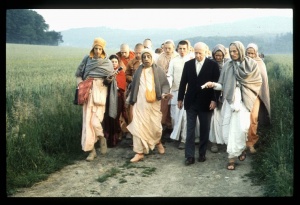CC Adi 7.143 (1975): Difference between revisions
(Vanibot #0027: CCMirror - Mirror CC's 1996 edition to form a basis for 1975) |
(Vanibot #0020: VersionCompareLinker - added a link to the Version Compare feature) |
||
| Line 2: | Line 2: | ||
<div style="float:left">'''[[Sri Caitanya-caritamrta (1975)|Śrī Caitanya-caritāmṛta (1975)]] - [[CC Adi (1975)|Ādi-līlā]] - [[CC Adi 7 (1975)|Chapter 7: Lord Caitanya in Five Features]]'''</div> | <div style="float:left">'''[[Sri Caitanya-caritamrta (1975)|Śrī Caitanya-caritāmṛta (1975)]] - [[CC Adi (1975)|Ādi-līlā]] - [[CC Adi 7 (1975)|Chapter 7: Lord Caitanya in Five Features]]'''</div> | ||
<div style="float:right">[[File:Go-previous.png|link=CC Adi 7.142 (1975)|Ādi-līlā 7.142]] '''[[CC Adi 7.142 (1975)|Ādi-līlā 7.142]] - [[CC Adi 7.144 (1975)|Ādi-līlā 7.144]]''' [[File:Go-next.png|link=CC Adi 7.144 (1975)|Ādi-līlā 7.144]]</div> | <div style="float:right">[[File:Go-previous.png|link=CC Adi 7.142 (1975)|Ādi-līlā 7.142]] '''[[CC Adi 7.142 (1975)|Ādi-līlā 7.142]] - [[CC Adi 7.144 (1975)|Ādi-līlā 7.144]]''' [[File:Go-next.png|link=CC Adi 7.144 (1975)|Ādi-līlā 7.144]]</div> | ||
{{CompareVersions|CC|Adi 7.143|CC 1975|CC 1996}} | |||
{{RandomImage}} | {{RandomImage}} | ||
==== TEXT 143 ==== | ==== TEXT 143 ==== | ||
| Line 25: | Line 24: | ||
<div class="translation"> | <div class="translation"> | ||
"If one develops his love of Godhead and becomes attached to the lotus feet of Kṛṣṇa, gradually he loses his attachment to everything else. | |||
</div> | </div> | ||
| Line 32: | Line 31: | ||
<div class="purport"> | <div class="purport"> | ||
This is a test of advancement in devotional service. As stated in Śrīmad-Bhāgavatam ([[SB 11.2.42]]), | This is a test of advancement in devotional service. As stated in Śrīmad-Bhāgavatam ([[SB 11.2.42]]), bhaktir pareśānubhavo viraktir anyatra ca: in bhakti, a devotee's only attachment is Kṛṣṇa; he no longer wants to maintain his attachments to many other things. Although Māyāvādī philosophers are supposed to be very advanced on the path of liberation, we see that after some time they descend to politics and philanthropic activities. Many big sannyāsīs who were supposedly liberated and very advanced have come down again to materialistic activities, although they left this world as mithyā (false). When a devotee develops in devotional service, however, he no longer has attachments to such philanthropic activities. He is simply inspired to serve the Lord, and he engages his entire life in such service. This is the difference between Vaiṣṇava and Māyāvādī philosophers. Devotional service, therefore, is practical, whereas Māyāvāda philosophy is merely mental speculation. | ||
</div> | </div> | ||
Latest revision as of 19:18, 26 January 2020

A.C. Bhaktivedanta Swami Prabhupada
TEXT 143
- kṛṣṇera caraṇe haya yadi anurāga
- kṛṣṇa vinu anyatra tāra nāhi rahe rāga
SYNONYMS
kṛṣṇera—of Kṛṣṇa; caraṇe—at the lotus feet; haya—becomes; yadi—if; anurāga—attachment; kṛṣṇa—the Supreme Personality of Godhead; vinu—without; anyatra—anywhere else; tāra—his; nāhi—there does not; rahe—remain; rāga—attachment.
TRANSLATION
"If one develops his love of Godhead and becomes attached to the lotus feet of Kṛṣṇa, gradually he loses his attachment to everything else.
PURPORT
This is a test of advancement in devotional service. As stated in Śrīmad-Bhāgavatam (SB 11.2.42), bhaktir pareśānubhavo viraktir anyatra ca: in bhakti, a devotee's only attachment is Kṛṣṇa; he no longer wants to maintain his attachments to many other things. Although Māyāvādī philosophers are supposed to be very advanced on the path of liberation, we see that after some time they descend to politics and philanthropic activities. Many big sannyāsīs who were supposedly liberated and very advanced have come down again to materialistic activities, although they left this world as mithyā (false). When a devotee develops in devotional service, however, he no longer has attachments to such philanthropic activities. He is simply inspired to serve the Lord, and he engages his entire life in such service. This is the difference between Vaiṣṇava and Māyāvādī philosophers. Devotional service, therefore, is practical, whereas Māyāvāda philosophy is merely mental speculation.